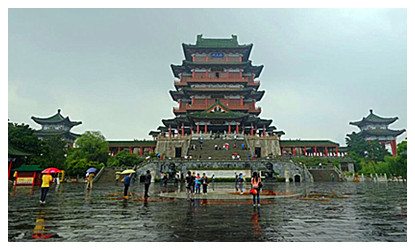Tengwang Pavilion
 River.Tengwang Pavilion also has the reputation of being the 'First Pavilion of Xijiang River' and has been widely admired by visitors from all over the world. In terms of its height, overall size and architectural style, this pavilion is a prime example of such buildings for which China is justifiably famous.
River.Tengwang Pavilion also has the reputation of being the 'First Pavilion of Xijiang River' and has been widely admired by visitors from all over the world. In terms of its height, overall size and architectural style, this pavilion is a prime example of such buildings for which China is justifiably famous.
Li Yuanying, a brother of Emperor Tang Taizong (Tang Dynasty 618-907) who assumed the name Tengwang upon being knighted, commissioned the original three storied, thirty meters high building in the year 654 during the Tang Dynasty (618-907). The pavilion was named after him but it was to undergo reconstruction as a consequence of events during its 1,300 year long history. Wang Bo, a gifted and well known poet of the Tang Dynasty, wrote his 'Essay on Tengwang Pavilion' thus documenting its importance. However, probably the worst tragedy occurred in 1926, when it was destroyed by fire during the conflicts between the Northern Warlords. The current building is the result of rebuilding that was carried out between 1983 and 1989.
The existing pavilion is even more spectacular and magnificent than its predecessors. Reached by a Nine-zigzag bridge and surrounded by rock gardens and lakes, it is built in the architectural style of the Song Dynasty (960-1279).
Tengwang Pavilion is in fact a complex and not just a single structure. The principle building, covering 47,000 square meters, is nine storied and 57.5 meters in height. Two smaller pavilions stand on the north and south sides of the main building. Their elegance and simplicity is set off by glazed jade-green tiles on the roof, pretty eaves and red pillars. Engraved screens enhance the interiors.
Tengwang Pavilion was always a place where learned men gathered to write articles and hold banquets, therefore the display in the new pavilion gives prominence to culture. A variety of bass-relief and frescoes demonstrate that men of talent have brought glory to this place. The plagues, steles, couplets on the columns of the hall are all selections of celebrities. Musical instruments, bronze sacrifice, ritual article, serial bells impart a classical elegance to this new pavilion.
Travel Tips
Add: on the shore of the Gan River, in Nanchang City, Jiangxi Province.
How to get there: Take subway line 1 to Tengwangge Station directly. Take bus no. 2, 7, 8, 26 and 302 (Inner line) to get off at Tengwangge Station.
Entrance Fee: CNY 50
Opening Hours: 08:00-18:00







 Ask Questions ?
Ask Questions ?